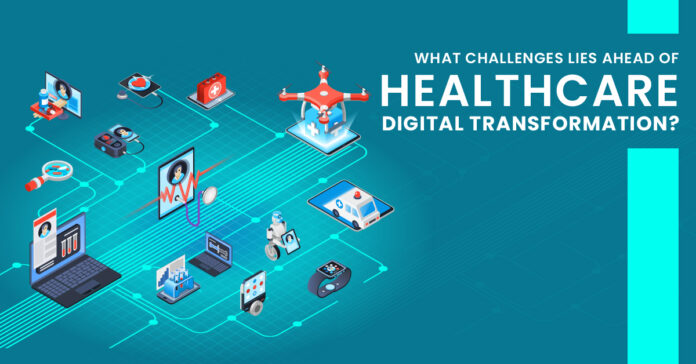The digital healthcare market is poised to reach $1.5 trillion by 2030.
There is a new paradigm in healthcare- it’s called the patient-centered approach. Overall, this approach creates new opportunities for your business to streamline operations, understand what the patient requires and build trust and loyalty. Digital transformation is required for this patient-centric approach. Understand that digitization in healthcare will allow providers to learn more about their target users and perform customer-centric activities. This will ultimately add value to the business.
One must address the challenges faced in the process to leverage the full potential of digitization in healthcare. Let’s discuss these challenges in detail.
Challenges of digital transformation in healthcare
Healthcare organizations must deal with many obstacles within the healthcare domain in their quest to achieve effective digital transformation. Instead of spending a lot of money advertising their services and products, healthcare institutions must find creative ways to stand out from the crowd. This way, they can ensure success in the digital domain. This is because, contrary to the traditional domains, healthcare institutions and professionals need to be dynamic and change with the changing times to succeed in the digital domain. The following are the major challenges faced in implementing digital transformation in healthcare.
Poor interoperability amongst different software systems
Poor software interoperability is one of the major issues in achieving digital transformation in healthcare. Business software is becoming increasingly integrated, with many features that cannot be achieved without integrating two or more systems. Healthcare, in particular, has noticed the power of this integration. Want to give your patients access to their medical records and software or quickly gain information about other aspects of patient management? What you need is a robust software integration with your existing healthcare software.
There is no standard for interoperability between your company and third-party software, so even though you want to integrate the software with your workflow, there is a chance that it doesn’t go as well. This means you won’t be able to fully use the features of whatever software you’re integrating and won’t be able to get the most out of it. The healthcare industry is in a state of rapid evolution as more entrepreneurs enter the digital healthcare arena. This warrants a better integration between different healthcare software. Without robust integration, digital transformation in healthcare is difficult to achieve.
Thinking of customers and employees
One of the biggest hurdles in digital transformation is the fixed mindset of customers and employees. We humans do not like change. Some people are reluctant to change because of the anxiety that comes with it. They are hesitant because they find comfort with what they’ve been doing, and the thought of change can be overwhelming. Yet, when you look at the situation, long-term change is often necessary to improve processes and services.
Whenever faced with the prospect of change, our response is common “it’s not worth the risk.” But we shouldn’t be too hasty. There is a lot of potential in digital transformation and managing the risks is important to succeed in the digital world. The increasing popularity of digital transformation is well known, so it’s not surprising that healthcare providers worldwide have started to undergo digital transformation. They do this to remain competitive and attract new market share.
Digital transformation is not just about building software. It is about changing how you think and work as well. With new healthcare technologies being implemented in the healthcare sector, it becomes nearly impossible to keep up with your competition without doing so. Clients are keen to integrate digital solutions into their organizational and personal situations. It is not just an objective change in how healthcare service providers cooperate with their customers; it is also a change that reflects a paradigm of the use of technology. Some customers and employees are quite cautious and may not like the idea of digital transformation, while others are enthusiastic. The trick is to ensure that you successfully adapt to the needs and wants of your customers and employees at all times.
Data protection regulations to obey
Health sector organizations must protect patient data with a robust data security system. There are strict laws enforced by the government, like HIPAA, which protects patients’ personal and sensitive information. General data protection laws like GDPR protect all kinds of personal data, including healthcare data.
Meeting GDPR and HIPAA standards can be challenging for many IT companies, but the top healthcare app development company with dedicated developers in the industry can help you build a healthcare and medical app that complies with data privacy regulations of different countries.
Handling patient data can thus prove to be an especially challenging task that warrants special attention.
Need for designing new processes
So, let’s assume you carefully analyzed your medical business needs and prepared a great digital transformation strategy. You chose the best software on the market and invested in additional business solutions like an interactive website, a mobile application for patients, a chatbot or voice assistant, etc. You have all modern digital products implemented. Is that all?
As we wrote before, digital transformation is not only about fancy digital business products, but also about changing the way you think and run the business. By replacing your old business tools, like server-based patient management systems, with new ones, you also need to develop new, more efficient business processes for which an efficient team of healthcare app developers can help you design new processes.
Prohibitive costs
Implementing new IT solutions can be incredibly expensive-especially if you are a healthcare organization. However, the costs usually pay off in the long run, as digital transformation can yield massive benefits for your healthcare institution. You are saving a lot of money by offering new, modern technology to your customers. Apart from this, you also increase your income while selling medical devices and services.
Conclusion
It is difficult to overcome the challenges mentioned above in the digitization of healthcare but hiring dedicated developers with experience and expertise in the healthcare and the medical industry can make it look easier. This way, you can easily achieve digital transformation in healthcare.















